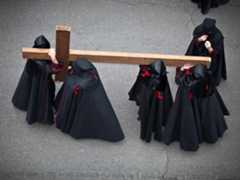Our editors will review what you’ve submitted and determine whether to revise the article.
- The Church of Jesus Christ of Latter-day Saints - Apostle
- The Church of Jesus Christ of Latter-Day Saints - The 12 Apostles of Jesus Christ: Then and Now
- Heritage History - First Century - The Apostles and their Disciples
- Jewish Virtual Library - Apostle
- Humanities LibreTexts - Apostles of Jesus
- Live Science - The apostles: How Jesus' followers founded Christianity
- JewishEncyclopedia.com - Apostle and Apostleship
Apostle
Apostle, (from Greekapostolos, “person sent”), any of the 12disciples chosen byJesus Christ. The term is sometimes also applied to others, especiallyPaul, who was converted toChristianity a few years after Jesus’ death. InLuke 6:13 it is stated that Jesus chose 12 from his disciples “whom he named apostles,” and inMark 6:30 the Twelve are called Apostles when mention is made of their return from themission of preaching and healing on which Jesus had sent them. The full list of the Twelve is given with some variation in Mark 3, Matthew 10, and Luke 6 as:Peter andAndrew, the sons of John (John 21:15);James andJohn, the sons of Zebedee; ;Philip;Bartholomew;Matthew;Thomas;James, the son of Alphaeus;Jude, orThaddaeus, the son of James;Simon the Cananaean, or the Zealot; andJudas Iscariot.
The privileges of the Twelve were to be in continualattendance on their master and to be the recipients of his special teaching and training. At least once they were sent on a special mission, two by two, to announce the imminence of the messianic kingdom (Mark 6:compare Matthew 10; Luke 9). Three of them, Peter, James, and John, formed an inner circle who alone were permitted to witness such events as the raising of Jairus’s daughter (Mark 5:37; Luke 8:51), theTransfiguration (Mark 9; Matthew 17; Luke 9), and the agony of Jesus in theGarden of Gethsemane (Mark 14:33; Matthew 26:37).
Special importance seems to have been attached to the number 12, which some scholars interpret as a reference to the 12 tribes ofIsrael. When a gap had been left by the defection and death of the traitor Judas Iscariot, immediate steps were taken to fill it by the election ofMatthias (Acts 1). It is to members of this band of 12 that the word Apostle is usually applied inActs.

Paul himself claimed the title of Apostle, apparently on the grounds that he had seen the Lord and received a commission directly from him. This appears to be in agreement with the condition in Acts that a newly appointed Apostle should be capable of giving eyewitness testimony to the Lord’s Resurrection. According to some early Christian writers, however, some were called “apostles” after the period covered by the New Testament. The word also has been used to designate a high administrative orecclesiastical officer.








